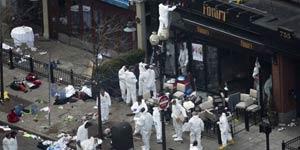TerrorismExperts debate the vulnerability of Midwest cities to terrorist attacks
The crises in Syria and Iraq have increased worries about terror cells taking aim at American targets, specifically New York, Boston, and Los Angeles. As larger cities step up their counterterrorism efforts, however, analysts debate whether less populated cities in the Midwest are safe or just as vulnerable to terror attacks.

Questions arise regarding the terror threat in the midwest // Source: q8ping.com
The crises in Syria and Iraq have increased worries about terror cells taking aim at American targets, specifically New York, Boston, and Los Angeles. As larger cities step up their counterterrorism efforts, however, analysts debate whether less populated cities in the Midwest are safe or just as vulnerable to terror attacks. Former FBI special agent and security expert Manny Gomez explained to CBS-DC that Midwest cities may be more vulnerable to terror attacks because these cities lack the resources larger cities allocate to counterterrorism efforts. “Certainly, the Midwest is an easier target without a doubt,” Gomez said. “However that doesn’t necessarily equate that terrorists would target those cities, because you get less bang for your buck. They want a high value target such as New York City. It has always been and always will be their crown jewel. They want to attack the greatest population to get international notoriety. It’s also the financial heart of the country. It’s always been and quite frankly will always be the number one target.”
Anthony Lemieux, a researcher with the National Center for the Study of Terrorism and Responses to Terrorism at the University of Maryland, believes that cities in the Midwest are not more vulnerable to terror attacks. “I don’t think cities in the Midwest are at a higher risk than cities like New York City,” Lemieux said. “One of the biggest cities in the Midwest is Chicago and certainly there have been plots there in the past. Any time that you have a popular center of any magnitude, that will make it a more attractive target.” He added, “I don’t think there would be any kind of shifting because there is increased security in bigger cities.”
Lemieux is concerned with home grown terrorism. Analyst say the recruitment efforts of young Somali men in Minnesota by al-Shabaab and the return of foreign fighters from the Syrian civil war represents the greatest potential for a terror attack in the United States. “Kansas City had an attack and we are seeing terrorism in some of these Midwest pockets,” he said. “The Jewish center shooting is terrorism by any definition. The Las Vegas attack is terrorism by any definition. Everywhere has potential strengths and vulnerabilities to face a terrorist attack at the end of the day.” Still, larger cities like New York are higher valued targets for terrorists and that is likely to remain the case.
